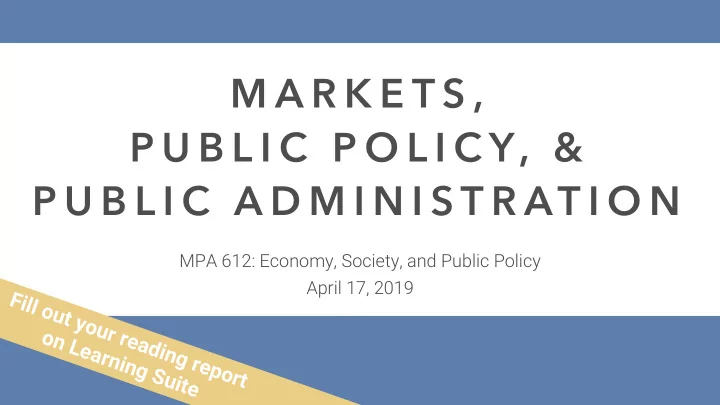

M A R K E T S , P U B L I C P O L I C Y, & P U B L I C A D M I N I S T R AT I O N MPA 612: Economy, Society, and Public Policy April 17, 2019 Fill out your reading report on Learning Suite
P L A N F O R T O D A Y What the h*ck did we just learn? Why does this all matter? What do we do now?
W H AT T H E H * C K D I D W E J U S T L E A R N ? !
M A I N T A K E A W A Y S Economic principles You now think differently. Institutions Social phenomena are messy and complicated. Analysis Economic analysis is great. And limited.
M O S T I M P O R T A N T P R I N C I P L E S Opportunity costs Incentives Nudges Efficiency, fairness, equitability, justice Markets are great Markets can fail We can fix those failures We can make those failures worse
I N S T I T U T I O N S R U L E T H E W O R L D We are influenced (greatly) by external institutions Institutions are how we fix market failures Institutions are crucial for good policy Institutions are hard to change
A N A LY T I C A L T O O L S Indifference curves Supply and demand Elasticity Game theory Gini coefficients Inflation Growth rates CBA Discount rates RCTs, RDDs, Diff-in-diffs, DAGs
W H Y D O E S T H I S A L L M AT T E R ?
“Evidence isn’t important just for accountability; it’s essential for innovation.” David Bornstein, “The Dawn of the Evidence-Based Budget”
Duflo’s recipe for fixing poverty with policy Easy! Understand health, education, savings, labor markets, institutions, incentives, and politics
Duflo vs. institutional nihilism Yes, institutions are powerful and path dependency is a thing But there’s room for substantial changes and improvements Economic policies rooted in evidence can change lives and politics
For this to work, you have to understand economic principles https://www.youtube.com/watch?v=2wiZoGZJN3s “Conventional economics is a form of brain damage”
W H AT D O W E D O N O W ?
Economic models are overly simplified and wrong CBA numbers are always inaccurate We can’t measure anything perfectly Politics messes everything up
Don’t succumb to public administration nihilism You don’t need perfect information Muddling through is okay (and the only way)
Rational-comprehensive approach Systematically analyze every decision with perfect information, unlimited time, and unlimited intellectual capacity In 1950s/60s, PA schools taught students to not do this because it’s impossible But they still did GUESS WHAT WE’RE TEACHING YOU
Successive limited comparisons approach (“muddling through”) Seek out empirical evidence + live with real world constraints
Rational approach Muddling through Good policy = most appropriate Good policy = a bunch of means to a specific end people agree it’s good enough No variables are omitted—if Variables are omitted so, it’s an accident and bad on purpose and analysis is simplified Proposed changes are sudden, systemic, and Proposed changes are perfectly evidence-based incremental and marginal
“A wise policymaker consequently expects that his policies will achieve only part of what he hopes and at the same time will produce unanticipated consequences he would have preferred to avoid. If he proceeds through a succession of incremental changes , he avoids serious lasting mistakes in several ways.” Charles Lindblom, “The Science of ‘Muddling Through’”
Change must be incremental Institutions are sticky and hard to change Policies generally only get passed and adopted if they’re incremental
Choose something Do it If it works, improve it If it doesn’t work, fix it If the improvement (or fix) is good (or bad), adjust accordingly ↑ Keep doing all of that ↑
Recommend
More recommend